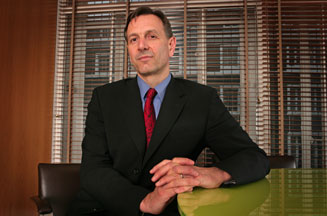One lengthy public sector interview process later, he emerged as the chief executive of an organisation boasting an annual adspend of about £150m and a turnover of £300m. As chief executive of ad agency DLKW, Lund, 49, is his own boss, but from June he will find himself in the very different position of reporting to Cabinet Office minister Liam Byrne.
As he contemplates his move out of adland, his hunting ground for nearly 30 years, Lund admits that his last day will be 'really weird'. Gazing around the DLKW boardroom, he adds: 'I've been in this building for 14 years. That's how long you stay in school.'
Lund, quick with his observations, compares the COI to Doctor Who's Tardis. 'It looks both smaller than it actually is and less modern when you are an outsider,' he explains. 'But when you get inside it you realise that there are hundreds of people doing everything from traditional advertising and events to PR, news management and direct marketing.'
He is aware that his appointment could be seen as 'more of the same' because his predecessor at the COI, Alan Bishop, is another old-school adman. One observer with close links to the COI argues that Lund's appointment represents a 'missed opportunity' to show that the organisation is moving with the times.
'Clearly it's an absolutely justified reservation,' says Lund when this is put to him. 'My training is advertising and I'm conscious of my limitations, but at this agency we have striven to diversify. I'm personally interested in the means of communication and bringing it together as a whole.'
Sensing that he is vulnerable to this sort of criticism, Lund has stated clearly that digital engagement will be a priority when he first walks through the COI's doors this summer.
No conversation about political marketing and the web can take place these days without a mention of US president Barack Obama and his use of digital media in last year's election campaign. Lund is particularly keen on the line taken by Thomas Gensemer, the managing partner of Blue State Digital, Obama's digital agency. Gensemer stresses that for all the technology available, at the heart of making digital work is knowing what you want to say. 'It's an enabler rather than a magical device,' says Lund.
Coincidentally, the Cabinet Office advertised for a 'director of digital engagement' in the week that it announced Lund's appointment. How the successful candidate will fit in with Lund's vision is not clear, as the role does not appear to be part of the COI. Understandably, Lund would prefer to turn his mind to such matters once in the post.
Another priority for Lund is more collaborative working at the COI. 'The organisation has grown organically. Five years ago, 60% of its budget went on traditional advertising; now the proportion is 40%. Digital has grown ten-fold at the COI. I want to make use of different media and channels as seamlessly and holistically as possible.'
Does this mean big changes are afoot? Probably not. Lund would rather speak of 'continuing momentum' than radical revolution. He believes that Bishop has improved the professionalism of the organisation and raised morale. So it is pretty safe to rule out a raft of Carol Fisher-style changes under Lund's leadership.
However, he does indicate a desire to create a 'buzzy' working environment at the COI's headquarters in Waterloo. 'I don't want it to be a retirement home or a backwater,' he says.
The COI's review of its creative agency rosters, which is due to kick off this summer, will reflect the way marketing has changed since the previous overhaul in 2004. Its three creative rosters will be merged, and a similar exercise will take place across the branding and brand strategy ones. 'The rosters will be more unified, so the [work proposed by] the agencies can be more unified,' says Lund. He does add, however, that there will still be room for specialist agencies.
During the selection process for the job, Lund made a point of asking whether, if he were appointed, DLKW, which has won a significant amount of COI business from a range of government departments, would suffer because of the need to avoid accusations of nepotism. However, he is satisfied that the part he will play on individual pitch processes is separate enough from his involvement in agency appointments.
Lund's shares in DLKW will be put into what is known as a 'blind trust', which allows those moving from the private to the public sector to be at arm's length from any financial concerns that could be construed as a conflict of interest.
Lund is disarmingly honest, but, wisely, treads carefully when asked about his personal political views. While declining to reveal how he voted in past elections, he does divulge that he made it to the polling station. 'A committed centrist who believes in the politics of fairness and good management - I'm not an ideologue,' is how he describes his world view. Readers can make of that what they will.
As the recession looms large in the commercial sector, Lund says he expects this to be reflected throughout Whitehall, with an emphasis on accountability. The COI will be no exception. Indeed, at last year's Conservative Party conference, shadow chancellor George Osborne pledged that if voted in, his government would cut adspend to offset its proposed freeze on council tax.
Lund steers clear of party politics, but says: 'I would imagine that the scrutiny on the way money is spent will be greater than it has been before.'
Nonetheless, he is adamant that government communication has a vital role to play. 'I do believe in the importance of what the COI does. If a government is communicating well with its electorate - and this doesn't mean just pumping out information, but initiating some sort of dialogue - then that's a good thing for a democracy.'



